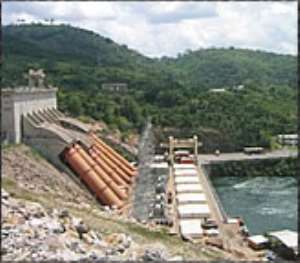
Speaking at the opening of a three-day partnership-training programme for Ghana/US National Association of Regulatory Utility Commissioners in Accra, Mr Adda said the proposal would help strengthen the PURC to work much more effectively.
'It is prudent to set up the regulatory agencies but we need to resource them adequately to enable them to carry out the onerous tasks required of them,' he said.
According to him the effective regulation of the power sector was a prerequisite for achieving improved delivery of electricity supply services and a necessary impetus to attracting independent power producers.
'It is my expectation that the regulatory agencies will be more aggressive in carrying out their mandate, ensuring more transparency in the regulatory environment as well as sustainability of the regulated industries,' Mr Adda stressed.
He urged the regulatory agency to derive better performance from the utility companies in all aspects of their operations, adding that these could be obtained by using incentive mechanisms as well as applying command and control measures.
Touching on energy sector reforms, Mr Adda reiterated government commitment to speed up the implementation of the reforms.
As part of the process, he said, government had incorporated the Ghana Grid Company and appointed a new Chief Executive Officer to begin the process of setting up a transmission entity separate from the Volta River Authority (VRA), which would only concentrate on generation of power.
The Minister said the move was one key reform that would pave the way for the active participation of independent power producers.
Part of the new company’s mandate would be negotiating power purchase agreements.
Mr Adda said the change would, however, take sometime to implement, as there were problems of assets transfer from the VRA to the new company and also of staffing requirements.
Mr. Kwadwo Mpiani, Chief of Staff and Minister of Presidential Affairs, said while the government was focusing on resolving the current energy challenges, it was becoming clear that government alone could not bear the increasing energy demandsof the country.
There was therefore the need for private sector participation and investment, he said.
Mr Mpiani said private investors would only put their money in the sector when they were assured of good regulatory environment that would guarantee a return on their investment.
The Regulatory Partnership Programme embracing the Public Utility Commission of Ohio, the Ministry of Energy, Energy Commission of Ghana and the PURC was inaugurated two years ago to foster exchanges between participating institutions on the best practices within the sector and also deliberate on topical issues.
The current workshop is focusing on the use of natural gas and the development of the secondary gas market when the West African Gas Pipeline Project comes on stream.
Mr Andrew Quayson, a Commissioner at the Public Utility Regulatory Commission, said on Monday that it was high time the issue of full cost recovery of utility tariffs for residential users was dealt with once and for all.
He said any delay in the implementation of the policy could lead to the collapse of the utilities and render them unable to deliver on their mandate.
Mr Quayson said it was important to ensure the financial viability of the utilities to enable them to invest in new equipment to render efficient services.
GNA




 Saglemi Housing Project will not be left to rot – Kojo Oppong Nkrumah
Saglemi Housing Project will not be left to rot – Kojo Oppong Nkrumah
 Transport fares hike: GPRTU issue two-day ultimatum
Transport fares hike: GPRTU issue two-day ultimatum
 ARC endorses Alan as presidential candidate – Buaben Asamoa
ARC endorses Alan as presidential candidate – Buaben Asamoa
 Akufo-Addo appoints Kwasi Agyei as new Controller and Accountant-General
Akufo-Addo appoints Kwasi Agyei as new Controller and Accountant-General
 PNC dismiss reports of mass resignations
PNC dismiss reports of mass resignations
 PAC advocates for revenue collectors to be engaged on commission basis, not full...
PAC advocates for revenue collectors to be engaged on commission basis, not full...
 Genser Energy commissions 110km of natural gas pipeline at Anwomaso
Genser Energy commissions 110km of natural gas pipeline at Anwomaso
 Naa Torshie calls for tolerance, peace ahead of 2024 election
Naa Torshie calls for tolerance, peace ahead of 2024 election
 Asantehene commends Matthew Opoku Prempeh for conceiving GENSER Kumasi Pipeline ...
Asantehene commends Matthew Opoku Prempeh for conceiving GENSER Kumasi Pipeline ...
 Let’s do away with ‘slash and burn politics’ in Ghana — Dr Adutwum
Let’s do away with ‘slash and burn politics’ in Ghana — Dr Adutwum
